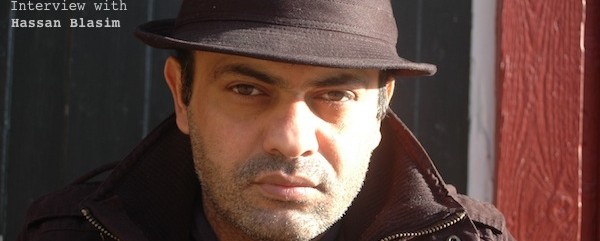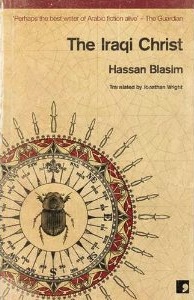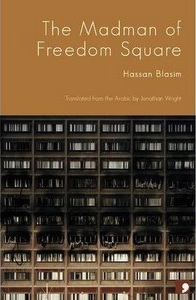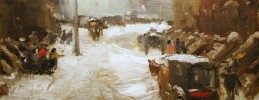
Hassan Blasim is a poet, filmmaker and short story writer. Born in Baghdad in 1973, he studied at the city’s Academy of Cinematic Arts, where two of his films Gardenia (screenplay) and White Clay (screenplay & director) won the Academy’s Festival Award for Best Work in their respective years. In 1998 he left Baghdad for Sulaymaniya (Iraqi Kurdistan), where he continued to make films, including the feature-length drama Wounded Camera, under the pseudonym ‘Ouazad Osman’, fearing for his family back in Baghdad under the Hussein dictatorship. In 2004, he moved to Finland, where he has since made numerous short films and documentaries for Finnish television. His stories have previously been published on www.iraqstory.com and his essays on cinema have featured in Cinema Booklets (Emirates Cultural Foundation).
After first appearing in English in Madinah, his debut collection The Madman of Freedom Square was translated by Jonathan Wright and published by Comma a year later (2009). Madman was long-listed for the Independent Foreign Fiction Prize in 2010, and has since been translated into Finnish, Spanish, Polish and Italian. A heavily edited version of the book was finally published in Arabic in 2012, and was immediately banned in Jordan. Hassan has won the English PEN Writers in Translation award twice, and was recently described by The Guardian as ‘perhaps the greatest writer of Arabic fiction alive’. The Iraqi Christ is his second collection.
~
Jonathan Wright studied Arabic at Oxford University in the 1970s and has spent 18 of the past 30 years in the Arab world, mostly as a journalist with the international news agency Reuters. His first major literary translation was of Khaled el-Khamissi’s best-selling book Taxi, published in English by Aflame Books in 2008.
~
Vicki Heath meets Hassan Blasim
and translator Jonathan Wright
in the Thistle Hotel in Euston, London:
Vicki Heath: Thank you for joining us at THRESHOLDS, especially after a few hectic days of launching your wonderful new collection, The Iraqi Christ.
Hassan Blasim: Thank you.
VH: I’d like to begin by asking you about the art of storytelling. In many of the stories in The Iraqi Christ, you tell a story within a story. Could you talk a little about this technique. Does it maybe help to make some kind of sense of all that’s happened in Iraq in the past?
HB: When I look at the writing of other Arabic writers they are more interested in language – in the beauty of language to tell a story. I am not against beauty in language, but I look at what has happened in Iraq and feel that I must tell this story. Because around the world, the media creates a different picture about violence in Iraq.
At the same time, I don’t want to just explain the violence. I’m an artist. I enjoy playing with stories, telling one story inside another story. I want to tell the stories of what happened in Iraq in a different way. Sometimes people say my writing is shocking – it’s too much maybe – but that’s what happened.
VH: Yes, there are a lot of harrowing images in your stories. Particularly the crucifixion in ‘A Thousand and One Knives’. Do the wars and violence ever overwhelm you when you’re writing?
HB: Many Iraqi writers say that what happened in Iraq is too much to write about. Of course, it can be too much for me personally – all the memories of it. It’s strange to write about, it’s difficult too, but this makes it a challenge.
VH: You use a first person narrative in all of the stories in the collection. Do you make a conscious decision to do this before you write?
HB: It’s just the way that I like to write. I think it’s more… honest. I feel when you tell stories in different ways all the time you’re trying to be smart. But this way, it’s coming from inside you. When you’re telling a story with first person, it’s more personal – for me, anyway – it shows my effects from the war. Personally I’ve had problems in Iraq. I just want to share it, like I would with a friend.
VH: You also use your own name in three of the stories. Is this part of the personal experience of writing?
HB: It is personal. All the time I ask myself ‘why do I write?’ I fight with writing – it’s not easy for me – it’s difficult to sit and write. So I put myself in the stories, by looking at myself from the outside. They all reflect me in some way.
VH: Within the stories the secondary characters tend to lead the way a lot, whilst the narrators are often in the background. Generally we don’t get to know the narrators names and we learn very little about their lives. Is there a reason that you write in first person and then focus on a different character and their story?
If you put a camera on a city street in Iraq,
everyone would come, wanting to tell a story.
HB: It’s just a technique. I’m interested in the rhythm of stories, because I really care about the rhythm – like in a film. I don’t want it to feel boring. It’s a change in the rhythm, to put the story to another person. And also maybe because, in Iraq, everyone wants to tell a story – because they have lived through forty years of violence.
If you put a camera on a street in Helsinki, no one would care. But if you put a camera on a city street in Iraq, everyone would come, wanting to tell a story. So I do that in my stories too: lots of people come with a story they want to tell, and after they disappear.
VH: It’s a fascinating technique. You also use a lot of elements of the fantastic in your writing – we teeter between the surreal and reality – is that part of changing rhythms, or is it something that provides a kind of escapism?
HB: Violence in the city is like a nightmare. It’s real and not real at the same time. Like when you experience pain in your body – when the pain disappears, and with time, your memory about the pain fades. So it’s real and not real. I want to talk about reality in Iraq. But as I write I think, I can’t talk about this just with reality because pain is not real sometimes. It’s like surrealism. This comes partly from what I feel around it – I feel like it’s not real.
VH: It’s sort of the way the mind detaches from reality?
HB: Yes. And it’s like dreaming too. All the stories come in more of a picture form for me. When I sleep I have many dreams; one day in Helsinki I went to the doctor and said, ‘I dream a lot, am I normal?’ and he said, ‘It’s okay, you’re a writer, just use it!’ [Hassan laughs]
 VH: When I start reading some of the stories, I feel like you’re almost guiding the reader to expect one thing and then you present us with something entirely different. ‘The Song of the Goats’ is initially a story of people outdoing each other to have the saddest, most harrowing war story, and then it goes on to focus on how a boy killed his brother in a septic tank and how his mother treated him for the rest of his childhood. It’s a really surprising turn in the story. Could you talk a little about setting up stories in one way and then moving them in another direction?
VH: When I start reading some of the stories, I feel like you’re almost guiding the reader to expect one thing and then you present us with something entirely different. ‘The Song of the Goats’ is initially a story of people outdoing each other to have the saddest, most harrowing war story, and then it goes on to focus on how a boy killed his brother in a septic tank and how his mother treated him for the rest of his childhood. It’s a really surprising turn in the story. Could you talk a little about setting up stories in one way and then moving them in another direction?
HB: As an example, in Baghdad, people can just be out shopping – they buy food, they buy apples – and suddenly there is a car bomb. That’s life sometimes; you pass by a car and life goes in a different direction.
The media create a big, simple picture of Iraq. But I’m interested in the details of the changes – like after a car bomb what happens to these people? I see life like that. You think life is simple, but it has a lot of surprise, a lot of change.
VH: That’s shown greatly in ‘The Hole’, when the narrator goes to get food from his old shop and is suddenly faced with three gunmen who pursue him. And then, just as surprisingly, he falls down a hole while he is being chased, and he meets the djinni who tells him about spending life in an ‘endless chain’.
HB: Yes, because in Iraq it has been like a chain, or a circle. For a long time people waited for the war to just finish, for the violence to finish, and they asked ‘what’s the solution?’ But it kept going in the same way. So it’s maybe the rhythm of what we’ve gone through in Iraq – this nightmare, this circle. Everything in normal life can be simple: I wanted to make films, I didn’t know about politics, and the surprise I got was prison, because I made short films.
VH: ‘The Song of the Goats’ focuses on the struggles of a boy with his mother and his uncle. It feels like there’s a domestic level of discomfort that’s maybe mirroring the state of the country. Is that the case?
HB: Yes, when I talk about the uncle working for the secret police, and the father away in the war, it’s like our life. For example, I have nine siblings, and all my family in Iraq went off to do different things. I left to be a writer, one of my brothers went to study religion, and one joined the police. And all of us, we have different opinions about politics and about life. So it’s just a symbol of some families in Iraq, and how conflict comes inside a family.
VH: I’d like to talk a bit about Dear Beto.
HB [laughing]: Okay, I don’t like that story too much.
Jonathan Wright: I rather liked this story. I don’t have a problem with it. It’s an interesting look at animal-human relations.
VH: It is. Using the perspective of a dog is a really creative method. And it’s set in Finland. How does living in Finland affect your writing?
HB: How much of an effect Finland has on my writing I don’t know, but they give me peace to sit and write. I do sometimes write about Finland, but I have to be careful. I feel I need to know more about the culture, about the language, to write about it. They ask me all the time, of course, to write something about Finland. But I don’t want to create clichés about Finnish people and I have far more memories about Iraq.
I use some images of Finland, some Finnish characters, but all the time I worry whether I am talking about the Finnish in the right way. In the West, people have created some clichés about our culture and I don’t want to create a cliché about the West. But maybe with time I’ll write more. When I know more about Finnish culture.
VH: Maybe in another eight years or so you’ll start writing more about Finland?
HB [laughing]: Maybe a novel just about forests.
VH: What’s your attraction to the short story form?
The short story is friendly. It’s easy.
It’s not like you’re trying to be
smart or philosophical.
HB: I spend a lot of time thinking about my stories – two or three months just thinking, until I see the beginning and the end. Then I write the story in just three days. I close the door and type. I can’t work on something for a long time, because I come up with a new idea and want to work on that. I enjoy the time of thinking about a story – the current character, the current picture, where the story is going. And when I see the whole story, I type.
The short story is friendly. It’s easy. It’s not like you’re trying to be smart or philosophical. In a novel, you have to talk about everything, you have to know about everything. But a short story is like me – I don’t know anything about life. [Hassan laughs]
VH: Is there much of a crossover between your short story writing process and your screenplays and films?
HB: Yes, I think it’s something similar. When I write a short film, I work in the same way.
VH: In the collection there are a lot of references to the pleasures of reading and to a thirst for knowledge. The narrators in both ‘A Thousand and One Knives’ and ‘The Green Zone Rabbit’ are almost obsessed with absorbing knowledge from books. Does this reflect you at all?
HB: It’s not just me, I think it reflects many Iraqi people. Books are like a symbol of peace. A lot of people in Iraq in the 70s had a good life, the country had a good education system, and then the war destroyed everything. So books mean peace and many people are now trying to find this way of life again. They want to know new ideas about religion, new ideas about people from the West, new ideas about our life. So I talk a lot about books – enjoying books, reading books – in order to understand life. In my stories, it’s not just about reading literature, it’s about education and knowledge. It is also personal, of course. I have always read a lot, but I am from a poor family; when I went to buy books they said, ‘Why do you buy books, why do you spend the money?’
VH: In ‘The Dung Beetle’, you quote one of Kafka’s shortest stories. What is it that draws you to Kafka in particular? Does his writing influence your work?
HB: I don’t want to say that, because many Iraqi writers say that two writers affect their work: Gabriel García Márquez and Kafka. Many writers say they are affected by them, but how many really are in reality?
I’m not as interested in what Kafka writes about.
For me, he’s an artist.
People discuss Kafka’s studies, his philosophies. But I’m not as interested in what Kafka writes about. For me, he’s an artist. He’s very good at telling a story with simple pictures, like I do. Simple and deep. So I like him in that way. He is an artist. A wonderful artist.
VH: Are there other short story writers that you’re drawn to?
HB: I also read a lot of Raymond Carver; I love him. I started reading him in English to help me learn the language. Lots of stories interest me though. On Iraqstory.com, we have many, many short stories translated from around the world – from Japan, the United States, England – so I read widely. But watching films influences me most. Of course, I read all the time, but I watch a lot of films, so films are with me more when I write. My favourites are from Lars von Trier and Andrei Tarkovsky.
VH: I wonder if we could talk a little about the translation process?
HB: Ah, ask Jonathan. [Hassan laughs]
VH: I’m intrigued about how it works. Is it difficult to get a convincing translation?
Jonathan Wright: Hassan’s work is very direct. He’s not somebody who likes to show off linguistically – he likes to tell us a very straight story – so that simplifies the translation process (although obviously I have to go back to Hassan with questions, as with every text). But the process is not that complicated and we don’t usually meet up during the translation process – especially as he lives in Finland. But we have extensive exchanges of emails and so on.
VH: You don’t just have to translate the literal words on the page, you have to get the feeling and emotional level of meaning across too. For example, in ‘The Iraqi Christ’ the waiter mixes up the names of the dishes with names of daily instruments of slaughter:
“One explosive, mind-blowing, gut-wrenching kebab. One
fragmentation stew. Two ballistic rice and beans.”
This comes across humorously and convincingly on the page, but is it close to the Arabic?
JW: Very close, yes. This passage required a certain amount of flexibility to make it sound plausible. But not much. I don’t feel the need to diverge very much.
Arabic is an unusual language – it’s a form of short-hand remember, I mean the short vowels are not marked – so ambiguities can arise, as with any text. Because Hassan writes in a very terse style, where sometimes the context is not apparent, I do have to double check who’s speaking, or who it refers to because in Arabic those things can get confused – more so than in other languages. You have to make some assumptions from the text, in a way that’s not true of English, for example.
Because Hassan writes things which are unexpected – a little surreal sometimes – I do have to sometimes check and say, ‘Do you really mean this?’ I’m sure it’s slightly annoying for Hassan, because it usually turns out that’s what he means. But as a translator, you’re reluctant to take risks, because it could be that this word has some sort of special Iraqi usage that I’m not aware of. Or perhaps he’s using it in some kind of ironic or metaphorical sense that I haven’t caught, so I need reassurance that I’ve got it right.
HB: Sometimes I have to explain the Iraqi colloquial elements to Jonathan too.
JW: Not that many though. He generally writes in what’s called ‘modern standard Arabic’, which is a universal Arabic. But I’m not particularly familiar with Iraqi colloquialisms. Arabic colloquial varies quite considerably – they’re not easily understood from one country to another, or one region to another. It’s like ‘kawwad’.
VH: What does that mean?
JW [laughing]: Err, ‘pimp’… [Hassan and Vicki laugh] That kind of stuff.
VH: Did Comma Press match you together?
JW: What happened is that Comma Press put together an anthology of short stories from the Arab world about cities – that came out about three or four years ago – and one of Hassan’s stories was chosen by Joumana Haddad, a Lebanese writer. Because I’d recently translated a book, my name appeared on some list and they sent me all the stories and asked me to choose one. I chose Hassan’s because I thought it was the most interesting. That was his first story published in English – ‘The Reality and the Record’ – which appeared in that anthology. And on the basis of that, Comma decided to do a collection. So we did The Madman of Freedom Square, which is a really nice collection with lots of nice stories.
VH: Yes, it is. And it’s done really well around the world too. It’s been highly acclaimed – the Guardian have named you as “perhaps the best writer of Arabic fiction”–
[Hassan laughs and turns away]
–and, just to embarrass you a little further, The Madman of Freedom Square was longlisted for the Independent Foregin Fiction Prize, and The Iraqi Christ received the English PEN Writers in Translation award this year. But on the other side, of course, Madman has been banned in Jordan. Perhaps, again, this is a question for you both – what’s your reaction to how your writing is perceived around the world?
It came as a little bit of a surprise that it
would be translated to Italian and Polish.
I never thought that would happen…
 HB: With The Madman of Freedom Square, it came as a little bit of a surprise that it would be translated to Italian and Polish. I never thought that would happen… In the Arabic world I write more on the internet: I stopped sending stories to newspapers and magazines, and I stopped trying to get a publisher. I tried with nine publishers to get The Madman of Freedom Square published in Arabic, and they all refused. Merit, in Egypt refused – they said, ‘Sorry, Hassan, maybe later we’ll publish your novels.’
HB: With The Madman of Freedom Square, it came as a little bit of a surprise that it would be translated to Italian and Polish. I never thought that would happen… In the Arabic world I write more on the internet: I stopped sending stories to newspapers and magazines, and I stopped trying to get a publisher. I tried with nine publishers to get The Madman of Freedom Square published in Arabic, and they all refused. Merit, in Egypt refused – they said, ‘Sorry, Hassan, maybe later we’ll publish your novels.’
JW: Really? Because Merit is usually quite open-minded.
HB: Yes. But maybe they just didn’t like it. So when it was translated into other languages, before being published in Arabic, it was a surprise, you know? I get a lot of good reviews. It’s nice – something good.
JW: I think his style doesn’t suit expectations of Arab publishers. It comes across to them as being too, kind of, brutal.
HB: One guy said that I don’t write with ‘beauty of language’, I just tell the story. This is unusual in the Arabic world. When you read a book, you see that not many authors are interested in telling a story.
JW: Yes, there isn’t much diversity in Arab literature. There are no police, or detective stories. No science-fiction, although a little science-fiction is starting to come. There’s no horror.
HB: And we’re full of horror in the Arabic world!
JW: So it’s been a rather narrow tradition since modern publishing began. But now diversity is beginning to come through.
VH: Is there as much frankness in the writing?
JW: The other writers are honest, within their parameters. But there’s not this tradition of hard-hitting storytelling, this kind of rather sparse writing – because Hassan’s writing is sparse. There’s no embellishment, it’s gritty. That’s a bit of a novelty for some of these publishers and they find it a bit disturbing, I think. There are also some religious elements they find quite difficult as well. Anything that could be perceived as contemptuous about religion, they’re very wary of. And there are elements of that in his writing.
VH: Are you hoping that The Iraqi Christ will be published in Arabic?
HB: I have a plan: I will put it on the internet for free in Arabic. I don’t want to try to publish it. The internet gives people the chance to read it. Some people say that I shouldn’t do that, that I’ll never get money from my writing if I put a new book on the internet. But we don’t get money from short stories, not in English either, not really. [Hassan laughs]
VH: What’s next for you?
HB: What’s next? This year my plan is to work on some films. I’ll do some writing, but slowly. Many magazines and newspapers have asked me to write short stories, so I must do some – here in England and in America – but I’m going to work more with films this year.
VH: Final question: ‘The Dung Beetle’ opens with two lines about who certain types of story are for:
Doctor, there are stories for children and very short stories for sick
people who no longer have much time. There are stories for the beach,
that is to say, summer stories for women reclining in the sun topless,
lazy stories about the excrement of reality, stories for the elite, for
boring times, for pregnant mothers, for prisoners.
I’m wondering, who are the stories in The Iraqi Christ for?
HB [laughing]: For all these readers! I don’t really know.
VH: Do you have one of these people in mind when you write?
HB: Not really. I guess, sometimes I write to my friend, a filmmaker, because he understands me. It’s not really to him, but I sometimes see my friend when I write.
VH: Hassan, Jonathan – thank you both so much for joining me today.
HB & JW: Thank you.


Thank You Vicki for this wonderful interview. It’s so nice getting to know new writers who come from a different perspective. i applaud Hassan for not giving up on his vision.
Thank you, Dora. Yes, Hassan is an inspiration with a remarkable talent. It was wonderful to meet him. Do read his second collection, it’s a very interesting insight into Iraqi life.